Udumbar – Ficus racemosa Uses, Research, Side Effects
Udumbara – Ficus racemosa or cluster fig is used since the times of Vedas in spiritual practices. Used extensively in Ayurveda to treat heavy periods, fractured bones, diabetes and more.
Botanical Name- Ficus racemosa Linn.(Ficus glomerata Roxb)
Family- MORACEAE (Vata kula)
Table of Contents
Vernacular names
Names in different languages:
English Name- cluster fig tree, country fig, crattock, gular fig, redwood fig
Hindi name- Gular
Kannada name : ಅತ್ತಿ ಮರ atti mara, arti, attee, atthi, golaru
Telugu name- Attimaram, athi, atti, boda, udumbaramu.
Tamil name – ஆனை anai, அத்தி atti, மலையின்முனிவன் malaiyin munivan, உதும்பரம் utumparam, aththi maram, araththamaram, alaram, aththikkai, aththipazham.
Telugu name – అత్తి atti, బొడ్డ bodda, బ్రహ్మమామిడి brahmamamidi
Urdu name – ڐومر dumar
Bengali Name- Dumur, উদুম্বর udumbara
Gujarati name: ગૂલર goolar, ઉંબરૉ umbaro
Hindi name – डूमर dumar, dimere, fagura, gular, phagoora, rumbal, umar, umrao.
Konkani name – ऋम्बड rhumbud
Malayalam name – അത്തി aththi, athi, attee, atthi.
Manipuri name – Heibong
Marathi name – उदुंबर udumbar, उंबर umbar, atti, audumbara, gular, umbra.
Nepalese name – दुम्री dumrii
Oriya name – dimri
Assamese name – যজ্ঞ ডিমৰু (Jagna Dimaru)
Simhalese name – අටිටිකිකා (Attikka)
Nepalese name – डुम्री (Dumri)
Thai name – มะเดื่ออุทุมพร (“Ma-Duer Uthumphon”) / มะเดื่อชุมพร (“Ma-Duer Chumphon”) in Vietnamese name – sung
Persian name – anjire-ahmaq.
Arab name – jammaiz.
Sanskrit Synonyms
Jantu phala, Jantukaphala, jantumati, krmiphalah – fruits are often infested with worms
sadaphala – fruits are always seen, in all seasons
Yajnayoga, yajniya, yajnnadumbura, Yajnanga – used as part of Hindu spiritual ritual called Yajna / Yaga
Pavitraka – auspicious
Sheetaphala – fruit is coolant
Saumya – it is a coolant tree
sheetavalka – bark acts as a coolant
ksheeri, Ksheeridru – yields latex
Apushpa, Shveta valkala, Hemadugha, dharma patra, pani bhuja, pushpa heena, umari, audumbara, Brahmavruksha, mashakin, sutah, vasudrumah, Hareetaksha, Supratishta, Kalaskandha.
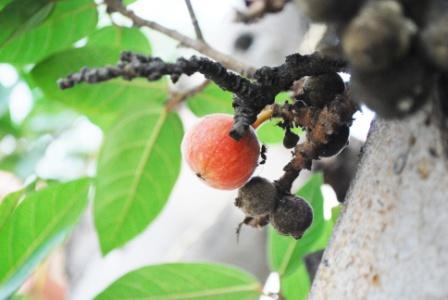
Classical categorization
Charaka-
Mutra Sangrahaneeya – group of herbs useful to restore normal quantity of urine
Kashaya Skandha – astringent tasting group of herbs
Sushruta- Nyagrodhdi Gana. Vagbhata- Nyagrodhdi
Varieties
Dalhana mentioned two varieties-
Udumbara – Ficus glomerata (also known as Ficus racemosa) and
Kasthodumbara/ Kakodumbara (Ficus hispida).
Rajanighantu mention three kinds of Udumbara, Nayodumbara and Phalgu (Anjeer / Ficus carica)
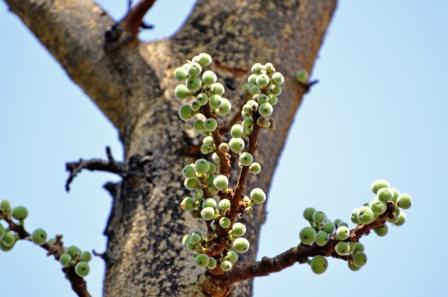
Distribution, Chemical constituents
Distribution: Found throughout India, this is native to Australia, Malaysia and Indonesia.
Ficus racemosa chemical constituents:
Leaves & Fruits- Gluacol
Fruits- B- Sitosterol, ceryl behenate, Lupeol, Friedelin (Reference: Illustrated Dravyaguna VIjnana, Vol. II, by Dr JLN Shastry)
Properties
Rasa (taste) – Kashaya (astringent)
Guna (qualities) – Guru (heavy), Rooksha (dryness)
Vipaka- Katu – Undergoes pungent taste conversion after digestion
Veerya – sheeta – coolant
Karma- Pitta- Kaphahara.
Pharmacological action – Astringent, Anthelmintic, Antidiuretic
Part used- Bark, Fruit, Latex
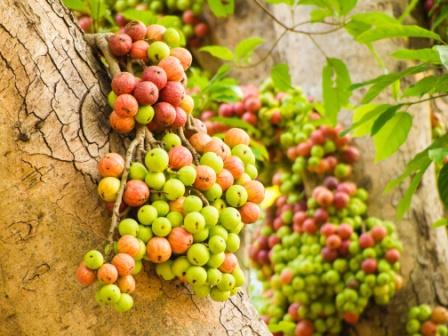
Properties as per Bhojana Kutuhalam
The udumbara phala is very cold in potency and treats bleeding disorders instantly. It is wholesome for the body especially in case of toxicity, aggravated pitta dosha, diseases of the head, mainly in epistaxis. The fruit when unripe is astringent and when ripe is sweet in taste. It cures intestinal worms, alleviates pitta and rakta, fatigue, burning sensation and thirst.
Dosage
powder 3-6 g;
kashaya – Decoction- 50-100 ml, in divided doses per day.
Latex 5-100 drops
Sanskrit verse
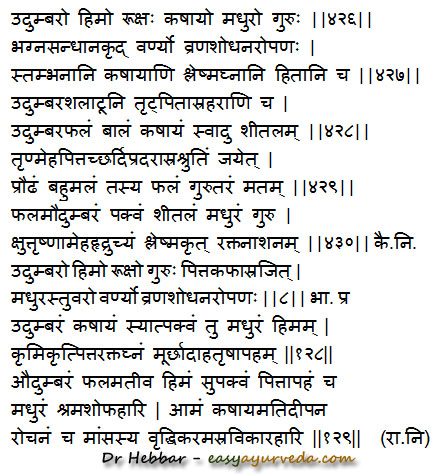
Medicinal uses
Ficus racemosa medicinal uses:
Bhagna Sandhana Krut – heals fractured bones and wounds
Varnya – Improves skin tone and complexion
Vrana Shodhana – cleanses and disinfects wounds
Vrana Ropana – heals wounds
Stambhana – Being an astringent herb, it brings about Stambhana – blocking effect.
Dahahara – Relieves burning sensation, as in gastritis, neuropathy, burning sensation in eyes etc
Murchahara – useful in patients with fainting disorder
Udumbara bark is one of the herbs used in herbal smoking blends
Bark, fruit uses
Cluster fig bark:
Its bark, along with many other is made into Kashayam, is administered as part of after-delivery care of mother
Cluster fig fruit:
Increases Kapha but decreases Pitta Dosha and is useful in blood vitiated disorders.
Trushnahara – Relieves thirst
Pittasrahara – Useful in bleeding disorders such as nasal bleeding, menorrhagia, rectal bleeding etc.
Ruchya – Improves taste
Shophahara – Relieves swelling, edema, anti inflammatory
Shramahara – Relieves tiredness, fatigue
Ripe fruit is heavier to digest and increases bulk of feces.
Unripe fruit of ficus racemosa –
Kashaya – astringent
Deepana – improves digestion strength
Rochana – improves taste, relieves anorexia
improves muscles
Swadu – sweet
Sheetala – coolant
Trushnahara – Relieves thirst
Mehahara – useful in urinary tract disorders and diabetes
Pittaja Chardihara – relieves vomiting due to Pitta origin
Pradarahara – relieves heavy periods – menorrhagia and excessive white discharge – leucorrhea
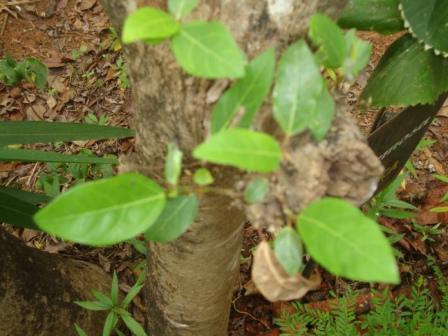
How to use it?
Cluster fig unripe fruits used for culinary purposes. It is used to make pickles, chutney, sambar, curry and Sabji.
Its unripe fruit is preserved in salt, so as to preserve for a long period of time.
Its latex is used in treating leucorrhea.
Its bark is made into Kashayam by taking a tablespoon of bark powder added with 2 cups of water, boiled and reduced to half a cup and filtered. This Kashayam is administered in 50 ml dose, once or twice per day.
Its decoction is also used for vaginal douche.
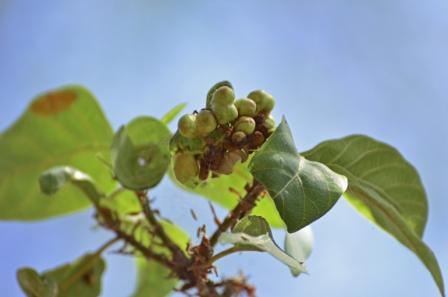
Side effects
Ficus racemosa side effects:
Because it is quite a coolant tree, exercise precaution in using Kapha dominant persons with recurrent allergic rhinitis, cough and cold.
Ripe fruit of country fig is usually avoided in culinary uses as it may cause or worsen intestinal worm infestation.
It is safe to use in children and during lactation. Consult your doctor for its safety during pregnancy.
Interaction with medicines, supplements
Can this be used while taking Homeopathic medicine?
Yes. This product does not react with homeopathic medicine.
Can this medicine be continued while taking supplements like multivitamin tablets, Omega 3 fatty acids etc?
Yes. Generally, this product goes well with most dietary supplements. However, if you are taking more than one product per day, please consult your doctor for an opinion.
With western
medicines
Seek your
doctor’s advice if you are taking this product along with other western
(allopathic / modern) medicines. Some Ayurvedic herbs can interact with modern
medicine.
If both Ayurvedic and allopathic medicines are advised together, then it is
best to take Allopathic medicine first, wait for 30 minutes and then take the
Ayurvedic medicine.
Ayurveda medicines
Ayurveda medicines with Udumbara ingredient:
Chandanasav – Ayurvedic medicine for nightfall, strength and digestion
Nyagrodhadi Churna – It is used in the Ayurveda treatment for urinary disorders and diabetes.
Nalpamaradi Oil – used as baby massage oil, also used in the treatment of skin diseases with itching such as eczema
Marma Gulika – used in diseases related to heart, brain, urinary system
Hemnath Ras – used in the treatment of frequent urination and diabetes.
Spiritual significance
Ficus racemosa in Hindu spiritual and religious practices:
Its tender leaves are used in Kalasha prokshana – to sprinkle sacred water to different places from a sacred copper mug.
Its bark is used as a source of fuel in Homa.
Morphology
Large deciduous tree
Young shoots are glabrous and pubescent
Bark – Smooth, reddish gray
Leaves – Dark green, ovate, entire margin
Fruits – Borne in large clusters on leafless branches, Globose or sub globose shaped, red when ripe, but unfit for eating as it is infested with maggots.
Sthanika Karma (Systemic Action)
External Application – It has Analgesic, wound healing, Anti inflammatory action. Its latex is indicated in various inflammatory conditions, wounds etc. Leaf bud can be used for external application to improve complexion. Decoction of the leaves is used for wound cleansing and for gargling in mouth diseases.
Internal administration-
Digestive system – Absorbent. reduces digestive fire. ripened fruit has the potential to increase the growth of worms within the intestines. Bark decoction indicated in rectal bleeding, Malabsorption syndrome, etc. Its latex can be given for kids to prevent diseases during tooth eruption.
Circulatory System – Bark and fruit is indicated in Bleeding disorders
Reproductive system – Uttara basti with bark decoction is indicated in Leukorrhea, Menorrhagia, Metrorrhagia etc. It can also be given as a garbha poshana medicine (helps to retain the pregnancy and promote fetal growth). Latex is indicated in premature ejaculation.
Excretory system – reduces urine output. bark decoction and fruit is indicated in diabetes.
Tapakrama – Ripened fruit is indicated in diseases associated with burning sensation.











9 comments
Prahladbhai D. Patel - ( Gujarat )
We thank very much sir, we are having advantages from your teachings of ayurved. Thank you again sir.
Khalid Lakdawala
I read about this herb’s efficacy in treating ulcerative colitis. Does Fig (fruit) which we eat generally possess same healing properties as Ficus racemosa?
Is Ficus racemosa available as a herbal product in the market? Please suggest a name if any.
Khalid H Lakdawala
very informative article,
Is Udumbara kvatha manufactured by any company and is it available in the market?
Rahul
Sir can you please share with us properties of dry fig fruit anjeer that we get in India?
Rasa wise it tastes Madhur/Kashaya. But is it Guru or Laghu, Snighda or Ruksha? What about other gunas like It definitely has Raktapitta shamak effect I felt in my tummy. But some text references would be very satisfactory.
Dr J V Hebbar MD(Ayu)Author
Will write about it soon. It is guru, madhura, sheeta veerya, rasayana, stambhaka
Dr J V Hebbar MD(Ayu)Author
No idea.
Rohini
Does Udumbara help to eliminate infertility
Yogesh Kumar
Please post a link… from where we can purchase the fruit powder.
Dr J V Hebbar MD(Ayu)Author
It is available in the form of tablet here
https://amzn.to/2zknit1